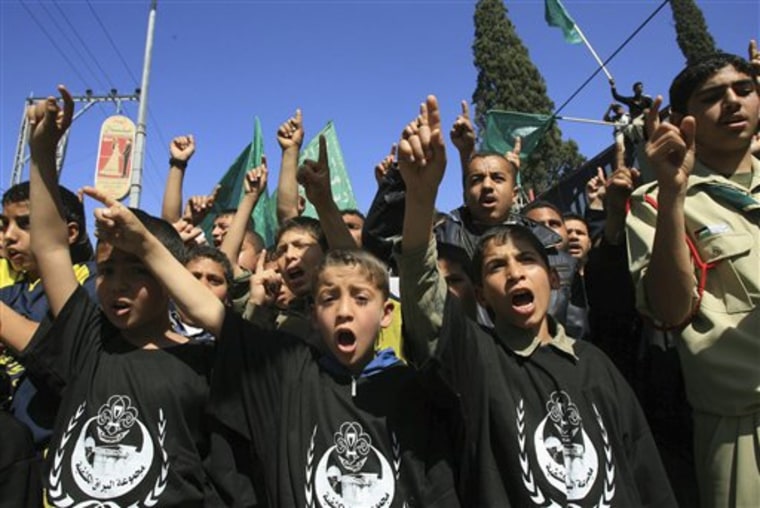President Bush's Mideast peace monitor sat down with Israeli and Palestinian representatives Friday for the first time since talks formally resumed nearly four months ago, but the atmosphere was clouded amid claims of an Israeli slight.
The Palestinians sent their prime minister, Salam Fayyad, while the Israelis dispatched a lower-level representative, Defense Ministry official Amos Gilad — a decision the Palestinians said showed a lack of seriousness.
The U.S. envoy, Lt. Gen. William Fraser III, must confront an upsurge in violence between the sides and the fact that neither the Israelis nor the Palestinians have fulfilled their obligations under the peace plan promoted by Bush.
Fraser's appointment was touted as a central feature of the U.S.-sponsored peace talks launched last November at Annapolis, Md. Those talks have made little apparent progress so far and critics have charged that it's taken a long time for Fraser to assume his role as the key arbiter of Palestinian and Israeli compliance with their obligations under the international peace plan known as the "road map."
In the plan's first stage, the Palestinians were to dismantle armed groups. The Israelis were to freeze construction in West Bank settlements and remove some of the more than 100 unauthorized outposts set up by settlers since the 1990s.
Israel recently announced several new building projects in east Jerusalem and the West Bank, areas the Palestinians want for their future state. The Israeli moves angered the Palestinians and were criticized by the U.S. and the international community, and Israeli defense officials said they were concerned Fraser might reprimand Israel at Friday's meeting.
Representatives of the sides met Friday morning at Jerusalem's King David Hotel. Sitting opposite Fayyad was Gilad, not his boss, former Israeli prime minister and current Defense Minister Ehud Barak.
The Palestinians' chief negotiator, Saeb Erekat, criticized that decision. The defense minister should have been there as a gesture of respect, Erekat said.
"It would have been very appropriate for Barak to go. Maybe Barak couldn't go because he is busy planning more (settlement construction) and more incursions," Erekat said.
'Frank exchange'
Israel's Defense Ministry released no official statement after the meeting. The U.S. Consulate in Jerusalem said the sides had discussed "where the parties are not meeting their commitments and the reasons why," and said the meeting included "a cordial but frank exchange of views."
Before the meeting began, Gilad described it only in general terms, telling Israel Radio that it was "part of the general dialogue between us and the Palestinians and us and the Americans" and part of an effort to "make progress in the peace process."
At the Annapolis summit, the sides agreed that the U.S. would monitor implementation, and Fraser, an air force general, was given the job.
The meeting was the first time Fraser has met with both sides and the first time Israeli and Palestinian teams have met since the most recent spike in violence began in late February.
The bloodshed saw an upsurge in Palestinian rocket fire from Gaza and an Israeli air and ground operation in the northern part of the territory in which more than 120 people were killed, including many civilians. In Jerusalem, a Palestinian gunmen killed eight Jewish students at a rabbinical seminary, and Israeli raids in the West Bank this week killed five militants, including one from a violent offshoot of Abbas' Fatah movement.
Before Annapolis, Israeli-Palestinian peace talks had been frozen during seven years of violence. Abbas and Israeli Prime Minister Ehud Olmert pledged to try to reach a peace agreement by the end of this year.
On Friday, Palestinians launched another four rockets from Gaza into Israel, causing no injuries, the Israeli military said.
